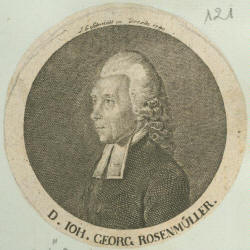

Queer Places:
Sankt-Johannis-Kirche
Wolfenbüttel, Landkreis Wolfenbüttel, Lower Saxony (Niedersachsen), Germany
 Johann Rosenmüller (1619 – September 10, 1684), one of the most important composers of instrumental music and sacred vocal music in Germany in the
middle of the seventeenth century, survived a homosexual scandal in Leipzig and
reconstituted his career in Venice.
Johann Rosenmüller (1619 – September 10, 1684), one of the most important composers of instrumental music and sacred vocal music in Germany in the
middle of the seventeenth century, survived a homosexual scandal in Leipzig and
reconstituted his career in Venice.
At age twenty-one Rosenmüller entered the University of Leipzig and became the assistant of the Thomasschule Cantor (or director of music). In 1651 he was appointed organist at the Nicolaikirche, one of the three important churches in the city. Two years later, the town council promised him the position of Cantor at the Thomasschule on the demise or resignation of the current holder. This was the same position that Johann Sebastian Bach would assume in 1723. In 1655, however, Rosenmüller's career was abruptly derailed when he and several choirboys were arrested on charges of homosexuality. He managed to escape prosecution and fled to Venice, where presumably a less restrictive environment existed. In Venice in 1658, Rosenmüller became a trombone player at St. Mark's, the most prestigious musical establishment in the city. A few years later, he attained a position as maestro di coro, or Master of the Chorus, at the Pio Ospedale della Pietà, a school for illegitimate girls that specialized in musical training. As late as 1682, he was being paid by the school as a composer. In Venice, Rosenmüller also continued to compose music (primarily masses, psalms, Magnificats, and motets, as well as instrumental sonatas), which reflected Italian influence and which circulated in Germany. Moreover, he attracted students who came to study with him from Germany. Thus, as a result of his disgrace, he helped disseminate Italian musical idioms in Germany. None of his music sets homoerotic texts, but some of his music for solo voices adopts an arguably eroticized approach to the setting of sacred texts. In 1682 he finally returned to his homeland to become the court composer at Wolfenbüttel in Saxony, where he died in 1684. At his death Rosenmüller was described as "the Amphion of his age." In the late eighteenth century, he was praised by Goethe. Recent recordings of Rosenmüller's sacred music have re-established him as a significant composer.
My published books: